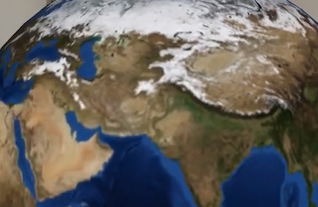Rotating world

Description
In this example we are adding a sphere with an image of the world as a material.
We then set it to continually rotate 360 degrees over a period of 10 seconds using SCNAction.
And last but not least, we are setting its Opacity to be 99%, to give it just a hint of transparency.
Video
Code
using ARKit;
using SceneKit;
using System;
using UIKit;
namespace XamarinArkitSample
{
public partial class ViewController : UIViewController
{
private readonly ARSCNView sceneView;
public ViewController(IntPtr handle) : base(handle)
{
this.sceneView = new ARSCNView
{
AutoenablesDefaultLighting = true
};
this.View.AddSubview(this.sceneView);
}
public override void ViewDidLoad()
{
base.ViewDidLoad();
this.sceneView.Frame = this.View.Frame;
}
public override void ViewDidAppear(bool animated)
{
base.ViewDidAppear(animated);
this.sceneView.Session.Run(new ARWorldTrackingConfiguration
{
AutoFocusEnabled = true,
PlaneDetection = ARPlaneDetection.Horizontal,
LightEstimationEnabled = true,
WorldAlignment = ARWorldAlignment.GravityAndHeading
}, ARSessionRunOptions.ResetTracking | ARSessionRunOptions.RemoveExistingAnchors);
var size = 1f;
var sphereNode = new SphereNode(size);
this.sceneView.Scene.RootNode.AddChildNode(sphereNode);
}
public override void ViewDidDisappear(bool animated)
{
base.ViewDidDisappear(animated);
this.sceneView.Session.Pause();
}
}
public class SphereNode : SCNNode
{
public SphereNode(float size)
{
var rootNode = new SCNNode
{
Geometry = CreateGeometry(size),
Opacity = 0.99f
};
var rotateAction = SCNAction.RotateBy(0, (float)(Math.PI), 0, 10.0);
var repeatForever = SCNAction.RepeatActionForever(rotateAction);
rootNode.RunAction(repeatForever);
AddChildNode(rootNode);
}
private static SCNGeometry CreateGeometry(float size)
{
var material = new SCNMaterial();
material.Diffuse.Contents = UIImage.FromFile("Images/world-map.jpg");
material.DoubleSided = true;
var geometry = SCNSphere.Create(size);
geometry.Materials = new[] { material };
return geometry;
}
}
}
Next Step : Environmental texturing
After you have mastered this you should try Environmental texturing


